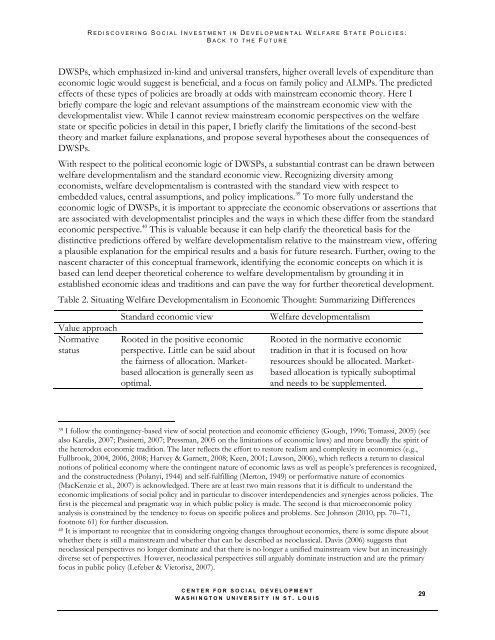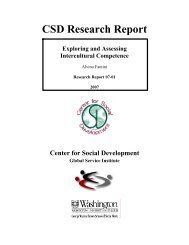Rediscovering social investment in developmental welfare state ...
Rediscovering social investment in developmental welfare state ...
Rediscovering social investment in developmental welfare state ...
Create successful ePaper yourself
Turn your PDF publications into a flip-book with our unique Google optimized e-Paper software.
R E D I S C O V E R I N G S O C I A L I N V E S T M E N T I N D E V E L O P M E N T A L W E L F A R E S T A T E P O L I C I E S :<br />
B A C K T O T H E F U T U R E<br />
DWSPs, which emphasized <strong>in</strong>-k<strong>in</strong>d and universal transfers, higher overall levels of expenditure than<br />
economic logic would suggest is beneficial, and a focus on family policy and ALMPs. The predicted<br />
effects of these types of policies are broadly at odds with ma<strong>in</strong>stream economic theory. Here I<br />
briefly compare the logic and relevant assumptions of the ma<strong>in</strong>stream economic view with the<br />
<strong>developmental</strong>ist view. While I cannot review ma<strong>in</strong>stream economic perspectives on the <strong>welfare</strong><br />
<strong>state</strong> or specific policies <strong>in</strong> detail <strong>in</strong> this paper, I briefly clarify the limitations of the second-best<br />
theory and market failure explanations, and propose several hypotheses about the consequences of<br />
DWSPs.<br />
With respect to the political economic logic of DWSPs, a substantial contrast can be drawn between<br />
<strong>welfare</strong> <strong>developmental</strong>ism and the standard economic view. Recogniz<strong>in</strong>g diversity among<br />
economists, <strong>welfare</strong> <strong>developmental</strong>ism is contrasted with the standard view with respect to<br />
embedded values, central assumptions, and policy implications. 39 To more fully understand the<br />
economic logic of DWSPs, it is important to appreciate the economic observations or assertions that<br />
are associated with <strong>developmental</strong>ist pr<strong>in</strong>ciples and the ways <strong>in</strong> which these differ from the standard<br />
economic perspective. 40 This is valuable because it can help clarify the theoretical basis for the<br />
dist<strong>in</strong>ctive predictions offered by <strong>welfare</strong> <strong>developmental</strong>ism relative to the ma<strong>in</strong>stream view, offer<strong>in</strong>g<br />
a plausible explanation for the empirical results and a basis for future research. Further, ow<strong>in</strong>g to the<br />
nascent character of this conceptual framework, identify<strong>in</strong>g the economic concepts on which it is<br />
based can lend deeper theoretical coherence to <strong>welfare</strong> <strong>developmental</strong>ism by ground<strong>in</strong>g it <strong>in</strong><br />
established economic ideas and traditions and can pave the way for further theoretical development.<br />
Table 2. Situat<strong>in</strong>g Welfare Developmentalism <strong>in</strong> Economic Thought: Summariz<strong>in</strong>g Differences<br />
Value approach<br />
Normative<br />
status<br />
Standard economic view<br />
Rooted <strong>in</strong> the positive economic<br />
perspective. Little can be said about<br />
the fairness of allocation. Marketbased<br />
allocation is generally seen as<br />
optimal.<br />
Welfare <strong>developmental</strong>ism<br />
Rooted <strong>in</strong> the normative economic<br />
tradition <strong>in</strong> that it is focused on how<br />
resources should be allocated. Marketbased<br />
allocation is typically suboptimal<br />
and needs to be supplemented.<br />
39 I follow the cont<strong>in</strong>gency-based view of <strong>social</strong> protection and economic efficiency (Gough, 1996; Tomassi, 2005) (see<br />
also Karelis, 2007; Pas<strong>in</strong>etti, 2007; Pressman, 2005 on the limitations of economic laws) and more broadly the spirit of<br />
the heterodox economic tradition. The later reflects the effort to restore realism and complexity <strong>in</strong> economics (e.g.,<br />
Fullbrook, 2004, 2006, 2008; Harvey & Garnett, 2008; Keen, 2001; Lawson, 2006), which reflects a return to classical<br />
notions of political economy where the cont<strong>in</strong>gent nature of economic laws as well as people‘s preferences is recognized,<br />
and the constructedness (Polanyi, 1944) and self-fulfill<strong>in</strong>g (Merton, 1949) or performative nature of economics<br />
(MacKenzie et al., 2007) is acknowledged. There are at least two ma<strong>in</strong> reasons that it is difficult to understand the<br />
economic implications of <strong>social</strong> policy and <strong>in</strong> particular to discover <strong>in</strong>terdependencies and synergies across policies. The<br />
first is the piecemeal and pragmatic way <strong>in</strong> which public policy is made. The second is that microeconomic policy<br />
analysis is constra<strong>in</strong>ed by the tendency to focus on specific polices and problems. See Johnson (2010, pp. 70–71,<br />
footnote 61) for further discussion.<br />
40 It is important to recognize that <strong>in</strong> consider<strong>in</strong>g ongo<strong>in</strong>g changes throughout economics, there is some dispute about<br />
whether there is still a ma<strong>in</strong>stream and whether that can be described as neoclassical. Davis (2006) suggests that<br />
neoclassical perspectives no longer dom<strong>in</strong>ate and that there is no longer a unified ma<strong>in</strong>stream view but an <strong>in</strong>creas<strong>in</strong>gly<br />
diverse set of perspectives. However, neoclassical perspectives still arguably dom<strong>in</strong>ate <strong>in</strong>struction and are the primary<br />
focus <strong>in</strong> public policy (Lefeber & Vietorisz, 2007).<br />
C E N T E R F O R S O C I A L D E V E L O P M E N T<br />
W A S H I N G T O N U N I V E R S I T Y I N S T . L O U I S<br />
29
















